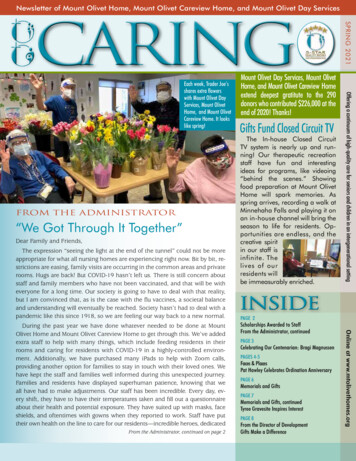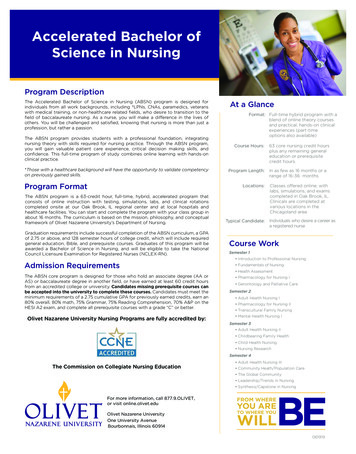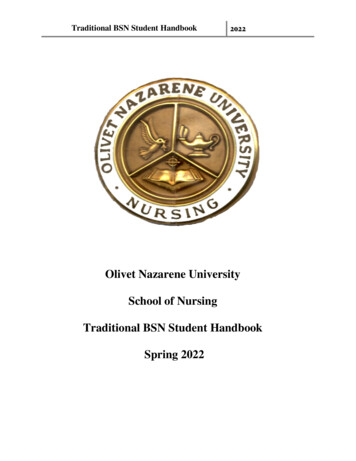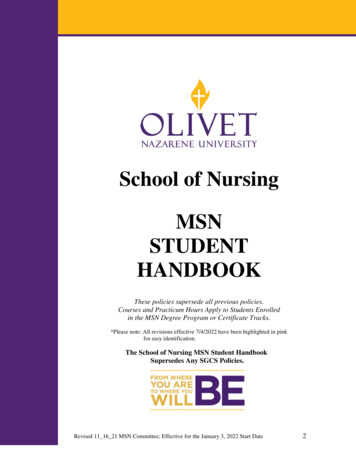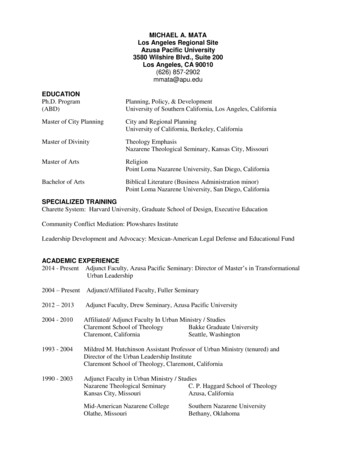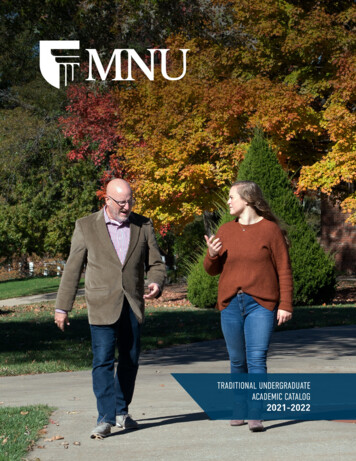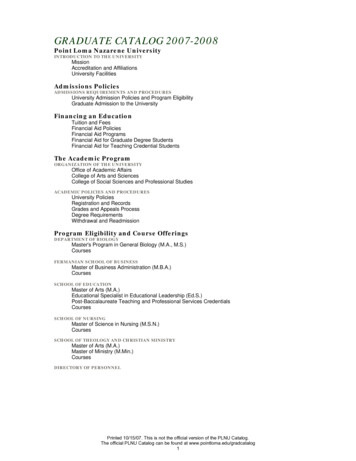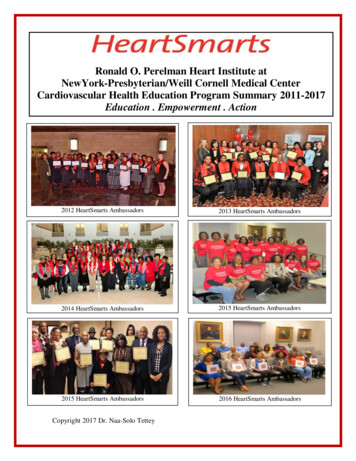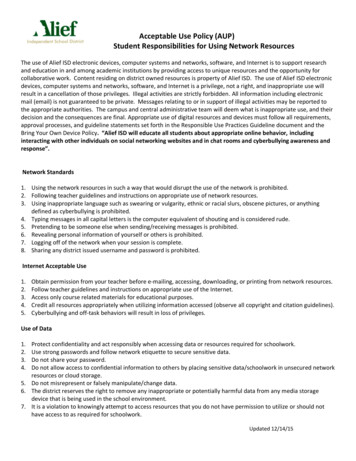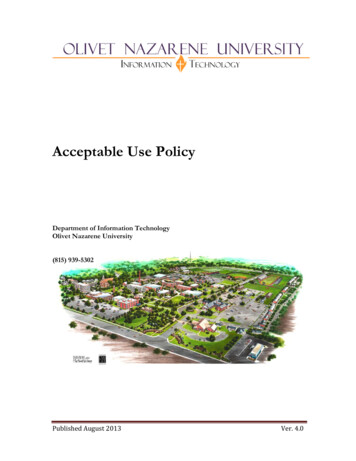
Transcription
Acceptable Use PolicyDepartment of Information TechnologyOlivet Nazarene University(815) 939-5302Published August 2013Ver. 4.0
Policy Overview1. Executive SummaryThis summary is intended to present a brief overview of the policies set forth by theDepartment of Information Technology at Olivet Nazarene University. It is by no meansexhaustive or detailed. A detailed document of the policies, procedures, and guidelines can befound at http://it.olivet.edu. By agreeing to the policies set forth by the University in theStudent Life Handbook, the user also agrees to follow and adhere to the policies set forth bythe Department of Information Technology found on the department website. These topicsinclude: Policy ChangesPrivacy & System MonitoringLab ComputersPersonal Computers and Deviceso Data Archivingo Mandatory CopyrightLicense for All Softwareo Repair Selection CriteriaWireless AccessInternet Content Filtering Copyright Infringement: DigitalMillennium Copyright Act(“DCMA”)Accounts & AccessPasswordsNetwork StorageProhibited Activitieso ViolationsDiscovery of PornographicMaterialsDisciplinary ActionsDisclaimer of LiabilityIntroductionThe Olivet Nazarene University campus computing network and telecommunicationsnetwork (ONUnet) exists to further the University's teaching, scholarly research, and spiritualgoals. The same ethical and community expectations outlined in the University LifeHandbook apply to the use of ONUnet. All equipment is subject to the rules and conditionsoutlined in this Policy, the Intellectual Property Policy which references and incorporates thisPolicy, and the University Life Handbook. Persons accessing any of the network resourcesare expected to practice common sense, decency, and courtesy to other users and third partystakeholders. Individuals are responsible for the proper use of the account, including properpassword protection. Any action that occurs on an individual’s account or workstation is theresponsibility of that individual. All students, faculty, and staff are responsible for seeing thatthese information systems are used in an effective, efficient, ethical, and lawful manner andfor the safeguarding and protection of their user names and passwords.Access to ONUnet is a privilege and may be revoked at anytime. It is provided as a resourceto the Olivet community. Access to ONUnet is restricted to authorized users, which isdefined as an individual who has been assigned an ID and password by InformationTechnology staff, or by any agent authorized by the Administrative Team. The use ofONUnet may be revoked at anytime, with or without notice, for any violation of the Policy,Ver. 4.0Page 2
including but not limited to misuse, abuse, infringement of third party intellectual propertyrights, exceeding authorized access, or vandalism to any system.This policy applies to networks and resources outside the University that access ONUnet viathe Internet. Network or resource providers outside the University may, in turn, imposeadditional conditions of appropriate use which the user should observe when using thoseresources.Disciplinary ActionsViolation of this Policy may be considered a violation of the Computer Fraud and Abuse Act(for exceeding authorized access) and may result in suspension or termination of the user’snetwork access, network account, or e-mail account. Suspending network access for theviolator may also result in the suspension of access for the entire room or apartment in whichthat violator resides (for students). Upon suspending the user’s access, the InformationTechnology Department will notify both the user and the Office of Student Development(for student violations) or the Human Resources Department (for faculty or staff violations).Suggested disciplinary actions for students include one or more of the following: Community serviceFines or restitution equal to technician’s timeCriminal or civil prosecutionNotification to parents, authorities, or head of academic departmentDismissal from the UniversityCounselingDisclaimer of LiabilityNeither the University nor any of its agents will be liable for any losses, including lostrevenues, or for any claims or demands against the users of ONUnet by any other party. Inno event will the University be liable for consequential damages, even if the University hasbeen advised of the possibility of such damages. The University will not be responsible forany damages due to the loss of output, loss of data, time delay, network system’sperformance, software performance, hardware damage, incorrect advice from a consultant, orany other damages arising from the use of the University's network systems, informationsystems, or technicians.Ver. 4.0Page 3
Expanded Policy Information1. IntroductionThe Olivet Nazarene University campus computing network and telecommunicationsnetwork (ONUnet) exists to further the University's teaching, scholarly research, and spiritualgoals. The same ethical and community expectations outlined in the University LifeHandbook apply to the use of ONUnet. All equipment is subject to the rules and conditionsoutlined in this Policy, the Intellectual Property Policy which references and incorporates thisPolicy, and the University Life Handbook. Persons accessing any of the network resourcesare expected to practice common sense, decency, and courtesy to other users and third partystakeholders. Individuals are responsible for the proper use of the account, including properpassword protection. Any action that occurs on an individual’s account or workstation is theresponsibility of that individual. All students, faculty, and staff are responsible for seeing thatthese information systems are used in an effective, efficient, ethical, and lawful manner andfor the safeguarding and protection of their user names and passwords.Access to ONUnet is a privilege and may be revoked at anytime. It is provided as a resourceto the Olivet community. Access to ONUnet is restricted to authorized users, which isdefined as an individual who has been assigned an ID and password by InformationTechnology staff, or by any agent authorized by the Administrative Team. The use ofONUnet may be revoked at anytime, with or without notice, for any violation of the Policy,including but not limited to misuse, abuse, infringement of third party intellectual propertyrights, exceeding authorized access, or vandalism to any system.This policy applies to networks and resources outside the University that access ONUnet viathe Internet. Network or resource providers outside the University may, in turn, imposeadditional conditions of appropriate use which the user should observe when using thoseresources.2. Changes to this PolicyThis policy may be changed, altered, or amended at any time. While the University willundertake reasonable efforts to make users aware of changes to this policy, ultimately it is theuser’s responsibility to visit the University’s Information Technology website to learn of thesechanges.3. Privacy & System MonitoringThe content of e-mail and data stored on ONUnet should not be considered private orconfidential. All emails and other electronic communications sent or stored on theUnviersity’s systems are considered the property of the University. The existence of suchemail, including header information indicating to whom the email was sent or from whom theemail was sent along with the time and date of the sending is also not considered private andVer. 4.0Page 4
confidential. Likewise, files attached to emails stored on ONUnet are also not consideredprivate and confidential.As a practical matter, the University does not review in the ordinary course the content orattachments of emails. Information Technology staff will, however, generally monitor allactivity on ONUnet. Individual users will not be intentionally monitored unless the usershows evidence of activity not in accordance with this Policy or applicable law whether theaction is intentionally malicious or not. In such a case, the University will take reasonablesteps to ensure the activity ceases. This includes, but is not limited to, monitoring usernetwork traffic, monitoring website accesses, accessing and viewing user data and searchingor seizing computers owned by the University, even if used by students, staff or faculty.While the University strives to maintain stability and security in all network systems, it doesnot guarantee the security, the confidentiality, or the integrity of any data stored ortransmitted through ONUnet. Security precautions and procedures are in place to preventsuch occurrences; however, the nature of data transmissions natively is not absolutely secure.The University will comply with all search warrants and subpoenas. By using the University’ssystems, you hereby give consent to disclosures in connection with search warrants,subpoenas, and investigations into suspected violations by users of this Policy or applicablelaw. The University reserves and intends to exercise the right to review, audit, intercept,access and disclose messages and date created, received or sent over its computer and/orsystems for any purpose.4. Lab ComputersThe University has several public computer labs on campus. Users are encouraged to usethese facilities for research, e-mail, and homework. Users should save documents every 5-10minutes to prevent loss of data. Documents should always be saved to external media or tothe user’s network drive. Data that is not stored in these locations may be erased andconsidered irretrievable. Never load personal programs or change settings on thesecomputers.5. Personal Computers and DevicesUsers are encouraged to bring personal computers to campus. Users are required to have upto-date antivirus software on their computers. In addition, users are required to install allservices packs and important or security updates for their operating system. It may also benecessary to install network support software, such as a network client or security agent.Users are required to register all network connected devices with Information Technology.5.1. Data ArchivingAll data archiving is subject to the University’s Intellectual Property Policy. It is theresponsibility of Olivet’s faculty, staff, and students requesting assistance fromVer. 4.0Page 5
Information Technology to backup all critical information including, but not limitedto, documents, spreadsheets, and databases, onto their H drives and/or externalmedia including, but not limited to, CDs, DVD’s, external devices, or flash drives.Media content and files should be copied to external media and not network drives.5.2. Mandatory Copyright License for All SoftwareInstallation of software requires proper licensing. This proof can be in the form of aCD with license kit, or a unique product ID. By using Olivet’s network you affirmthat you have legal entitlement or licensing to all software, media files, and all otherfiles on your computer.5.3. Repair Selection CriteriaInformation Technology reserves the right to refuse service to any computer. Therefusal may occur at any point during the service call.6. Wireless AccessTo compliment ONUnet’s wired network, Olivet’s Department of Information Technologyprovides complete campus wide wireless network access for all registered students, faculty,staff and guests in all residential and academic buildings as well as most outdoor locations.Wireless devices must be registered with Information Technology prior to placing them onONUnet. As complete coverage is available and to decrease disruption to this service usersare not permitted to use their own wireless access points (WAP’s) or devices capable ofperforming the function of an access point.Also to decrease the likelihood of interference, wireless printers are not permitted onONUnet unless the printer is directly connected to a computer and the wireless features havebeen disabled.7. Internet Content FilteringIn accordance and agreement with the University’s beliefs, principles, and communityexpectations outlined in the University Life Handbook, Information Technology willcontinuously monitor and prohibit access to websites that are pornographic in nature or aredeemed inappropriate for the Olivet community.8. Copyright Infringement: Digital Millennium Copyright Act (“DCMA”)It is the University’s policy to prohibit the unauthorized reproduction of copyright protectedmaterials in any medium. The following DMCA policy is part of our Intellectual PropertyPolicy and posted on the University’s website:If you believe that content available on or through this site (“Website”) infringesone or more of your copyrights, please send our Copyright Agent by mail, email orVer. 4.0Page 6
fax a notification (“Notification”) providing the information described below. Acopy of your Notification will be sent to the person who posted the materialaddressed in the Notification.Pursuant to federal law you may be held liable for damages and attorneys' fees ifyou make any material misrepresentations in a Notification. Thus, if you are notsure whether content located on or accessible via a link from the Website infringesyour copyright, you should contact an attorney.All Notifications should include the following: A physical or electronic signature of a person authorized to act on behalfof the owner of an exclusive right that is allegedly infringed. Identification of the copyrighted work claimed to have been infringed, or,if multiple copyrighted works at a single online site are covered by a singlenotification, a representative list of such works at that site. Identification of the material that is claimed to be infringing or to be thesubject of infringing activity and that is to be removed or access to which isto be disabled, and information reasonably sufficient to permit the serviceprovider to locate the material. Information reasonably sufficient to permit the service provider to contactthe complaining party, such as an address, telephone number, and, ifavailable, an electronic mail address at which the complaining party may becontacted. A statement that the complaining party has a good faith belief that use ofthe material in the manner complained of is not authorized by the copyrightowner, its agent, or the law. A statement that the information in the notification is accurate, and underpenalty of perjury, that the complaining party is authorized to act on behalfof the owner of an exclusive right that is allegedly infringed.\Notifications should be sent to:Jeffrey P. RiceOlivet Nazarene UniversityOne Univeristy Avenue, Bourbonnais Il 60915Fax: 815-939-5081Email: copyright@olivet.eduNOTICE TO REPEAT INFRINGERS OF THE DMCA POLICY:The University will terminate a user's access to our systems if, under appropriatecircumstances, the user is determined to be a repeat infringer. Since most faculty,Ver. 4.0Page 7
staff, and student positions require access to our systems in order to complete dutiesand obligations, termination of access due to repeat infringement can have seriousconsequences to employment or continued enrollment.9. Accounts & Access:Each full-time student, faculty, or staff member will receive a network account and an e-mailaccount. E-mail accounts will be maintained as long as the user is associated with theUniversity. Network accounts, including email, will be terminated after graduation orwithdrawal or upon termination of employment. Files existing in these accounts will bedeleted and will be irretrievable. E-mail accounts may be terminated for any of the followingreasons: Abuse or misuse, including but not limited to copyright violations or thetransmission of pornographyWithdrawal from the UniversityTermination of employment by the UniversityRequest by the Office of Student DevelopmentRequest by the Director of the Office of Human ResourcesRequest by the Academic DeanRequest by the Director of Information TechnologyRequest by the Department of Public SafetyDismissal from the UniversityNetwork and e-mail accounts assigned to an individual or group must not be used by others.Individuals are responsible for the proper use of the account, including proper passwordprotection. Any action that occurs on an individual’s account or workstation is theresponsibility of that individual.10. PasswordsIndividual’s are responsible for the proper use of all accounts (network, e-mail accounts, etc)including proper password protection. Passwords should never be shared with anyone andshould not be written in a location where they can be easily discovered. Any action thatoccurs on an individuals account or workstation is the responsibility of that individual. Noone from Information Technology will ever call and ask you for your password. If thisoccurs, please notify Information Technology immediately.11. Network StorageEach user may be granted a certain amount of storage space on the campus network. Thisstorage may be used to store authorized documents, research, and various class andappropriate personal files. Do not store music or video files on the network unless they areclass related. Disk and storage space will be monitored and files may be removed if the userVer. 4.0Page 8
is abusing the storage space provided. The user is responsible for deleting or removing old orobsolete files.12. Prohibited ActivitiesOne of the goals of the Department of Information Technology is to provide the Olivetcommunity and authorized users with a secure computing environment and eliminatecomputer and network abuse originating from Olivet’s campus. The University reserves theright to take immediate corrective action without prior notification to the user if a violation isadversely affecting ONUnet or any other telecommunications or computing networks.Immediate corrective action may involve disabling network accounts, e-mail accounts,network access, and any other means of stopping the violation.The Information Technology Department is charged with implementing enforcementdecisions arising from violations of this Policy. The University may, with or without notice,investigate and act upon any known or suspected violations of this Policy or any policy setforth by the University. The University may provide investigative support to, local, state, andfederal law enforcement agencies.Computer facilities at Olivet are a shared resource that requires users to observe standards ofbehavior to ensure the rights of other users. This resource is a privilege and may be revokedat any time. All users are expected to avoid the following violations:12.1. ViolationsThe following list of violations is provided as a list of examples only as is not meant to be exhaustive orcomplete.12.1.1. Malicious Activity Violations Attempting to defeat the network, servers, or administrative computer'ssecurity systems, mechanisms, or controls.Ver. 4.0 Possessing, using, distributing, or developing password cracking programs,algorithms, keystroke loggers, or any hacking utility. Launching or participating in a denial of service attack or any other actionwith the intent of damaging or disrupting any network, system, or device onor outside of ONUnet. Disabling, tampering with, or accessing any ONUnet system, network deviceor cabling. Any action intended to disrupt normal system services or which adverselyaffects other users' accounts, electronic material, e-mail, or networkperformance.Page 9
Any attempt to probe or scan ONUnet or any network outside of ONUnet. The creation or intentional distribution of any virus,worm, or malicious code.12.1.2. Unauthorized Access Violations Accessing or attempting to access another users’ data without theirpermission. Obtaining or using another person’s computer without their knowledge. Disguising one’s identity in any way, including the sending of falsifiedmessages, removal of data from system files, masking of process names,masking or spoofing of MAC or IP addresses or using any other unauthorizedIP address. Using or obtaining another user’s electronic identification is considered fraud.Electronic identification includes, but is not limited to: voice-mail passwords,telephone dialing codes, login ID, password, MAC address, IP address, e-mailaddress, ID card, or Tiger Dollars Card. Providing any unauthorized user with access to a personal login ID orestablishing any function or device which provides unauthorized access toONUnet via the Internet or otherwise.12.1.3. Security Violations Installing or using a wireless access point that is not owned by the University. Neglecting or purposely avoiding registering a personal computer withInformation Technology. Using a network-based proxy to circumvent content filtering systems,bandwidth control mechanisms, and any network security device.12.1.4. Digital Piracy Violations Obtaining, copying, or distributing copyrighted materials without theexpressed written consent of the copyright holder including but not limited tosharing unlicensed peer-to-peer files. See DCMA section above. Using, downloading, or installing any peer-to-peer file sharing application.12.1.5. Personal Conduct Violations Sending e-mail or any other type of electronic communication that containsprofanity, crude language, or sexually explicit messages, or any contentdefined as inappropriate by the University to any individual on or offONUnet.Ver. 4.0Page 10
Distributing, possessing, or accessing files, images, or videos that arepornographic in nature via ONUnet. This includes, but is not limited towebsites, electronic media, peer-to-peer, or file sharing programs. Any action that is deemed threatening or harassing to ONUnet users,administrators, or persons outside of ONUnet. Using ONUnet for commercial or solicitous purposes. Failure to report discovered network security flaws. Failure to report incidents of policy violations.12.1.6. Use of Unapproved Equipment Possessing or using routers or manageable switches Possessing or using wireless access points or range extending devices Possessing or using wireless printers without disabling the wireless featuresIn addition to other laws, rules, and regulations, all of the violations above, and any similarviolations, will be considered acts which exceed a registered user’s authorized access rightsand may be considered a violation of the federal Computer Fraud & Abuse 13. Discovery of Pornographic MaterialsIf pornographic or obscene files are located on a computer or if the user continuouslyattempts to access pornographic websites or materials, Information Technology may removenetwork service from the offending user and associated office, room or apartment. TheOffice of Student Development, the Office of Academic Affairs and/or the Office of HumanResources will be notified immediately. Service to the area may not be restored untilInformation Technology receives notice from the Office of Student Development, Office ofHuman Resources and/or the Office of Academic Affairs to reactivate network service.14. Disciplinary ActionsViolation of this Policy may be considered a violation of the Computer Fraud and Abuse Act(for exceeding authorized access) and may result in suspension or termination of the user’snetwork access, network account, or e-mail account. Suspending network access for theviolator may also result in the suspension of access for the entire room or apartment in whichthat violator resides (for students). Upon suspending the user’s access, the InformationTechnology Department will notify both the user and the Office of Student Development(for student violations) or the Human Resources Department (for faculty or staff violations).Suggested disciplinary actions for students include one or more of the following: Community serviceVer. 4.0Page 11
Fines or restitution equal to technician’s timeCriminal or civil prosecutionNotification to parents, authorities, or head of academic departmentDismissal from the UniversityCounselingIn addition, violations may subject the user to civil and criminal liability, including but notlimited to statutory damages under the Copyright Act or damages under the Computer Fraudand Abuse Act. The University will cooperate with any law enforcement investigations intoany user’s alleged violations of this Policy and may choose, at its own discretion, to cooperatewith any civil complainant.15. Disclaimer of LiabilityNeither the University nor any of its agents will be liable for any losses, including lostrevenues, or for any claims or demands against the users of ONUnet by any other party. Inno event will the University be liable for consequential damages, even if the University hasbeen advised of the possibility of such damages. The University will not be responsible forany damages due to the loss of output, loss of data, time delay, network system’sperformance, software performance, hardware damage, incorrect advice from a consultant, orany other damages arising from the use of the University's network systems, informationsystems, or technicians.Ver. 4.0Page 12
The Olivet Nazarene University campus computing network and telecommunications network (ONUnet) exists to further the University's teaching, scholarly research, and spiritual goals. The same ethical and community expectations outlined in the University Life Handbook apply to the use of ONUnet. All equipment is subject to the rules and conditions
